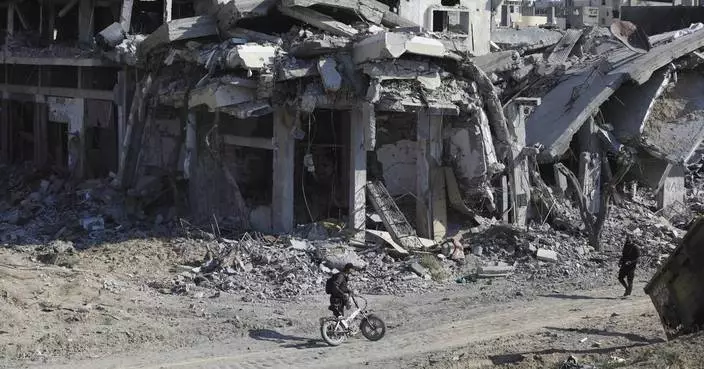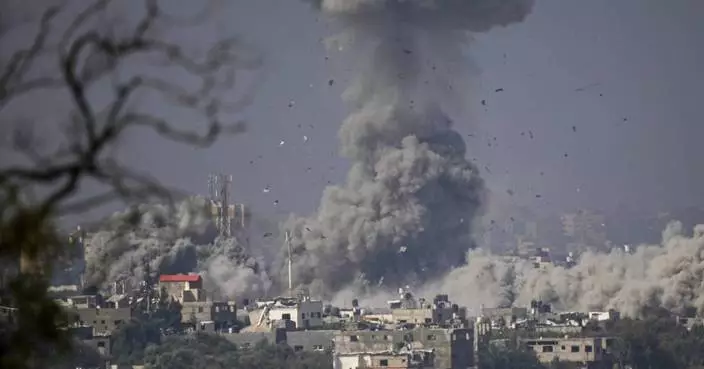A Roman Catholic bishop who has been outspoken in his criticism of President Daniel Ortega over Nicaragua's political standoff left the country Tuesday after being called to the Vatican indefinitely by Pope Francis.
Speaking at Managua's international airport, where no members of the country's Bishops' Conference were on hand to bid a farewell, Managua auxiliary Bishop Silvio Báez told journalists and supporters that he was leaving with "my heart broken into pieces."
"It hurts me to leave, but my heart remains here and I will always be following (the situation in Nicaragua) closely," Báez said. "As many times as may be necessary and as often as Pope Francis asks me to speak with him, I will give him my vision of reality in the most objective manner possible."
Báez, 60, who celebrated his last Mass in Nicaragua on Sunday, said he would visit relatives in Miami before traveling to Rome.
Báez has received multiple death threats and suffered a cut on his arm when he and other church officials were attacked by a pro-government mob last year in Diriamba. Drones hover over his home, and men on motorcycles have entered its parking area. He changed his phone number four times because of the threats.
When Francis told Báez he was needed in Rome, the pontiff did not say whether the decision was related to an alleged assassination plot that Báez said the U.S. government warned him of several months ago.
His transfer for an undetermined period of time was announced two weeks ago and prompted surprise and concern among the Nicaraguan opposition, as well as celebration by Ortega allies.
Báez acted as a mediator last year during brief, failed talks on resolving the crisis that erupted in April 2018 with large protests demanding Ortega leave office and allow early elections.
Ortega accused his opponents of attempting a coup, and security forces and armed civilian militias launched a crackdown in which at least 325 people were killed, more than 2,000 wounded and over 52,000 fled to exile, according to the Inter-American Commission on Human Rights.
Ortega had invited bishops to take part in the talks but later criticized them harshly.
A new round of negotiations with the Church not acting as a mediator but rather as an observer is currently on pause.
The government called on opponents to join talks Tuesday, but the Civic Alliance opposition group said Ortega has not abided by previous agreements on freeing all those considered political prisoners and restoring basic freedoms and rights.
At the airport Báez said he wishes for Nicaragua "a society founded in social justice that springs from a true peace, where ideological plurality is not a crime but a treasure."
He said he had received a letter of thanks on behalf of those who took part in the protests, and added that "the political prisoners have no reason to say thank you, it is us who should thank them for resisting."
Báez urged the Civic Alliance to remain "firm" but not break off dialogue and called on Nicaraguans to support its efforts.
THE HAGUE, Netherlands (AP) — Germany on Tuesday strongly rejected a case brought by Nicaragua at the United Nations' top court accusing Berlin of facilitating breaches of the Geneva Convention and international humanitarian law by providing arms and other support to Israel in its deadly assault on Gaza.
"The minute we look closely, Nicaragua’s accusations fall apart,” Christian Tams, a member of Germany's legal team, told the 16-judge panel at the International Court of Justice.
On Monday, Nicaragua urged judges to order a halt to German military aid to Israel, arguing that Berlin’s support enables acts of genocide and breaches of international humanitarian law in Gaza.
The head of Germany's legal team, Tania von Uslar-Gleichen, said Nicaragua's claims "have no basis in fact or law. They are dependent on an assessment of conduct by Israel, not a party to these proceedings.”
Preliminary hearings held Monday and Tuesday are focused solely on Nicaragua’s request for so-called provisional measures, including a court order for Berlin to halt military and other aid to Israel and reinstate funding to the U.N. aid agency in Gaza.
Closing Germany's arguments, Von Uslar-Gleichen urged judges not to impose preliminary measures and to toss out Nicaragua’s case.
Tams said that Germany had licensed only four exports of weapons of war to Israel since October, “three of which concern test or practice equipment.” He said 98% of military exports to Israel since the Oct. 7 attacks were not weapons of war, but other equipment.
Showing judges a photo of German aid being airdropped over Gaza, Tams added that Berlin continues to provide humanitarian support to Palestinians “every single day under extremely difficult conditions, constructively engaging with international partners.”
Nicaragua's case is the latest legal attempt to rein in Israel's offensive by a country with historic ties to the Palestinian people, after South Africa accused Israel of genocide at the same court late last year. It also comes against a backdrop of growing calls for Israel’s allies to stop supplying the country with weapons — and as some supporters, including Germany, have grown more critical of the war.
Speaking in Berlin, German Foreign Minister Annalena Baerbock told reporters that “from day one after Oct. 7, Germany has faced up to the incredible dilemma that Hamas deliberately entrenched itself behind civilians, deliberately used the human suffering of Palestinians and Palestinians in Gaza to expand its attack on Israel.”
Echoing comments by the German lawyers in court, Baerbock added that Germany is committed to international law, including the right to self-defense.
“This means that Israel has the right to defend itself, like every country in the world, against these terrorist attacks that continue to be carried out with the aim of destroying Israel as a state,” she said.
At Monday's hearings, Nicaragua’s Ambassador to the Netherlands, Carlos José Argüello Gómez, accused Germany of “failing to honor its own obligation to prevent genocide or to ensure respect of international humanitarian law.”
However, another lawyer for Germany, Samuel Wordsworth, argued that the court could not rule Germany was violating the obligation to prevent genocide because its judges have not ruled that Israel is breaching the Genocide Convention.
In a preliminary phase of the case brought late last year by South Africa, the U.N. court has said that it is “plausible” that Israel's actions in Gaza could amount to breaches of the convention.
“How can it be said that there was a failure to ensure respect of a third state, if the failure on the part of that third state to respect is not established in the first place?” Wordsworth said.
The court will likely take weeks to deliver its preliminary decision, and Nicaragua’s case will probably drag on for years.
Israel strongly denies that its assault amounts to genocidal acts, saying it is acting in self defense after Hamas-led militants stormed into southern Israel on Oct. 7, killing some 1,200 people.
Since then, more than 33,000 Palestinians have been killed in Gaza, according to the territory’s Health Ministry. Its toll doesn’t differentiate between civilians and combatants, but it has said women and children make up the majority of the dead.
According to the Stockholm International Peace Research Institute, Germany is second only to the U.S. in supplying arms to Israel — but it would be harder, if not impossible, for the U.S. to be brought before the court because Washington does not recognize the ICJ’s power to compel countries to appear before it. The U.S. also has not signed a protocol to the Genocide Convention that allows countries to bring disputes to the court.
Associated Press writer Kirsten Grieshaber in Berlin contributed to this report.
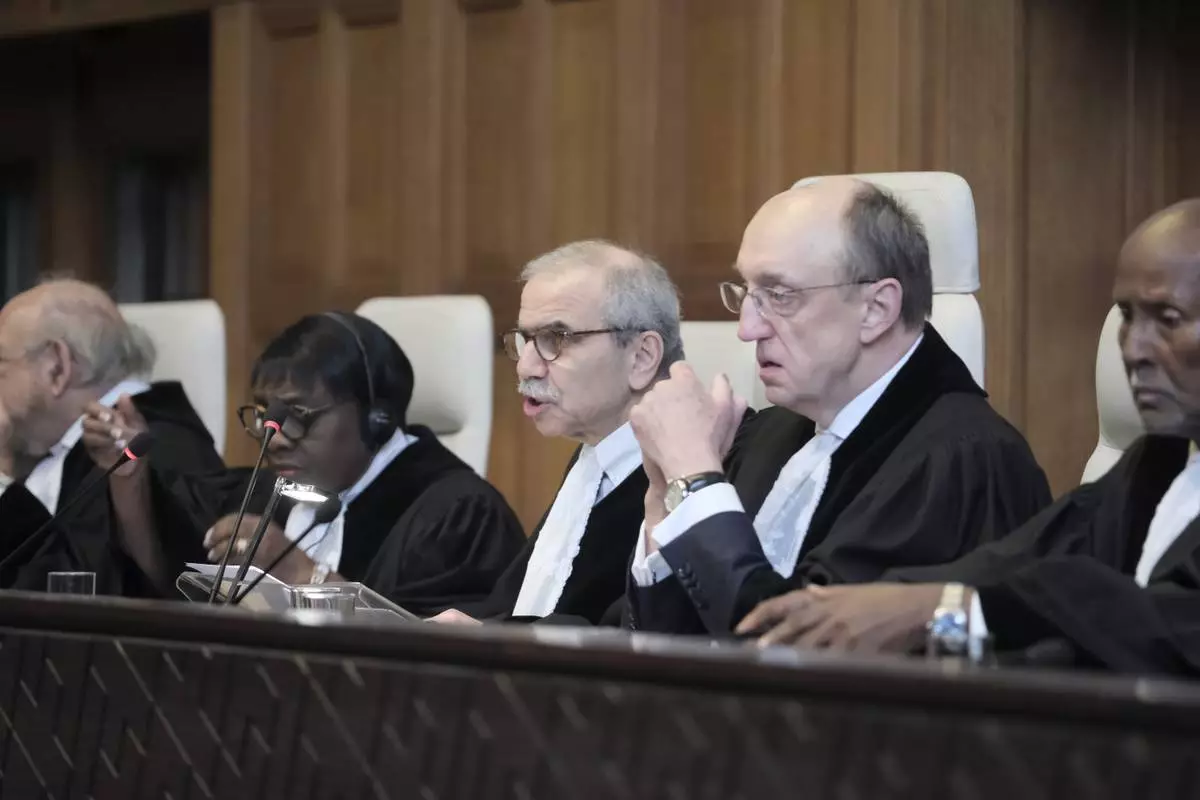
Judge Nawaf Salam, center, speaks at the start of a two days hearing at the World Court in The Hague, Netherlands, Monday, April 8, 2024, in a case brought by Nicaragua accusing Germany of breaching the genocide convention by providing arms and support to Israel. (AP Photo/Patrick Post)
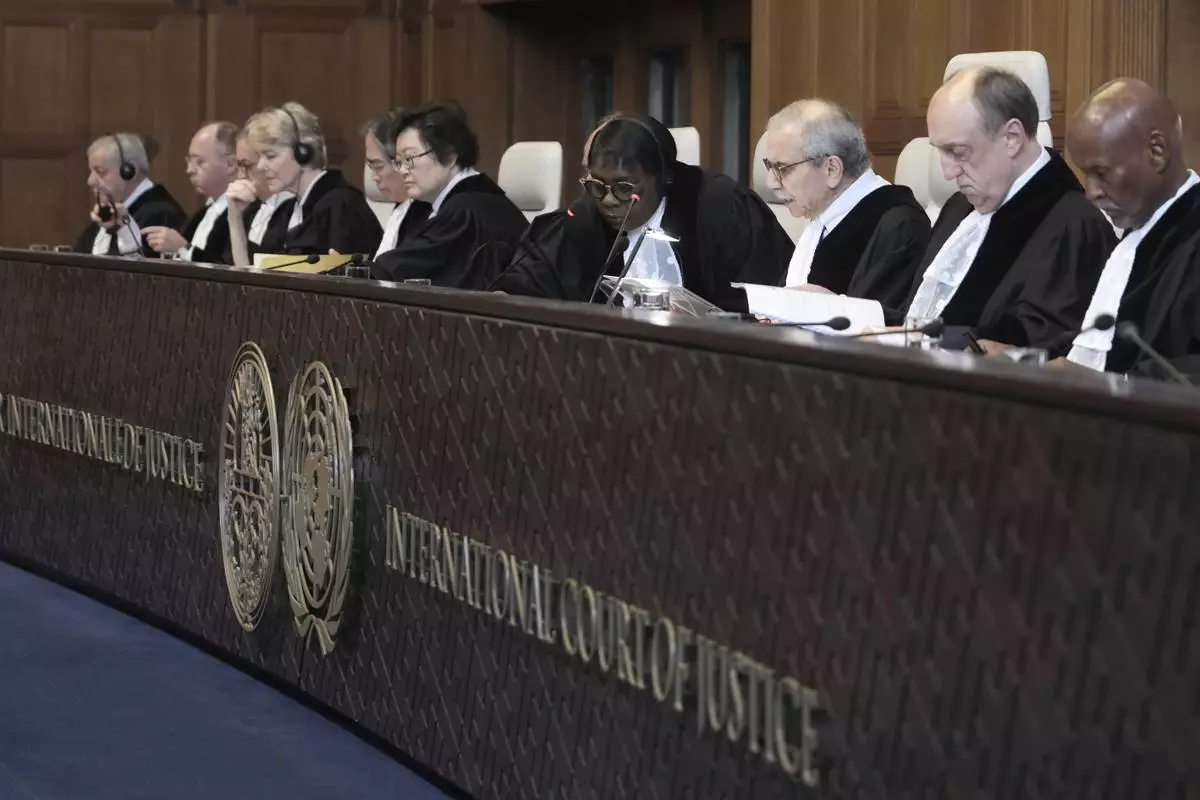
Judge Nawaf Salam, third right, speaks at the start of a two days hearing at the World Court in The Hague, Netherlands, Monday, April 8, 2024, in a case brought by Nicaragua accusing Germany of breaching the genocide convention by providing arms and support to Israel. (AP Photo/Patrick Post)
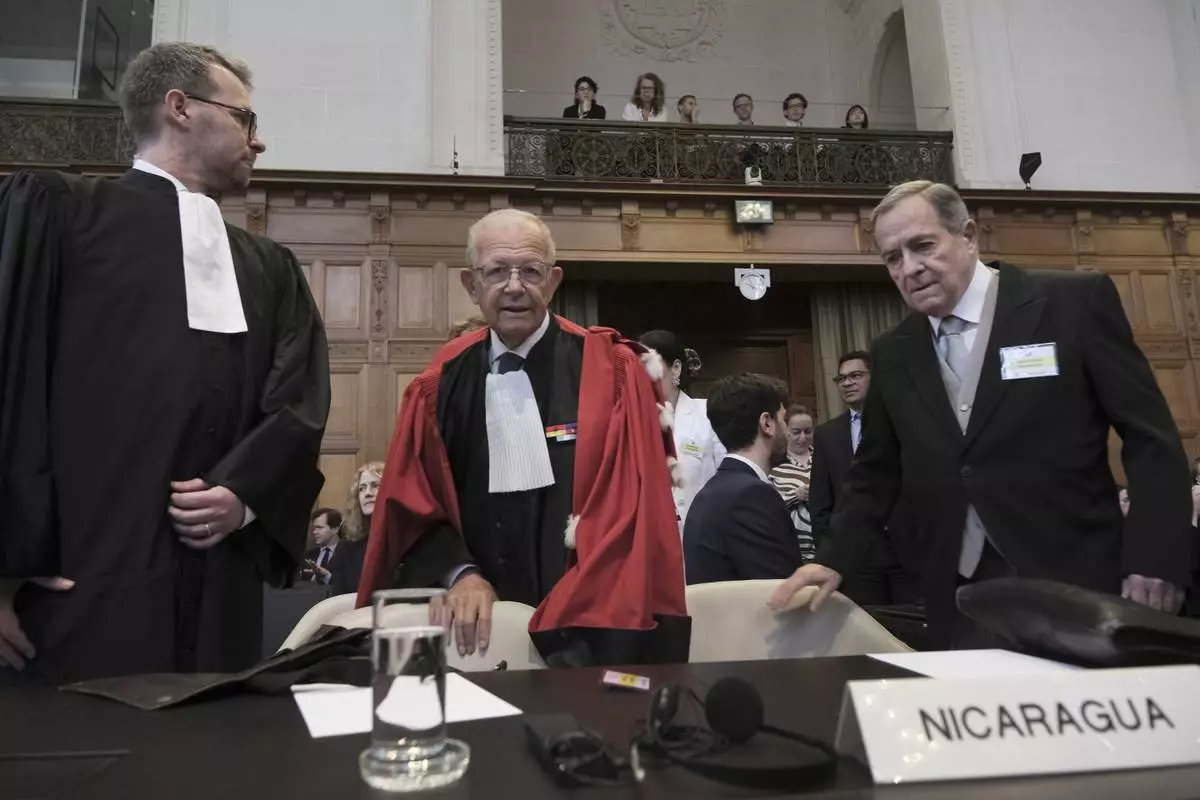
Nicaragua's Ambassador Carlos Jose Arguello Gomez, right, and Alain Pellet, center, a lawyer representing Nicaragua, arrive for the start of a two days hearing at the World Court in The Hague, Netherlands, Monday, April 8, 2024, in a case brought by Nicaragua accusing Germany of breaching the genocide convention by providing arms and support to Israel. (AP Photo/Patrick Post)

Tania von Uslar-Gleichen, Germany's legal adviser and Director-General for Legal Affairs of the German Foreign Ministry, center, shakes hands with Alain Pellet, left, a lawyer representing Nicaragua, prior to the start of a two days hearing at the World Court in The Hague, Netherlands, Monday, April 8, 2024, in a case brought by Nicaragua accusing Germany of breaching the genocide convention by providing arms and support to Israel. (AP Photo/Patrick Post)
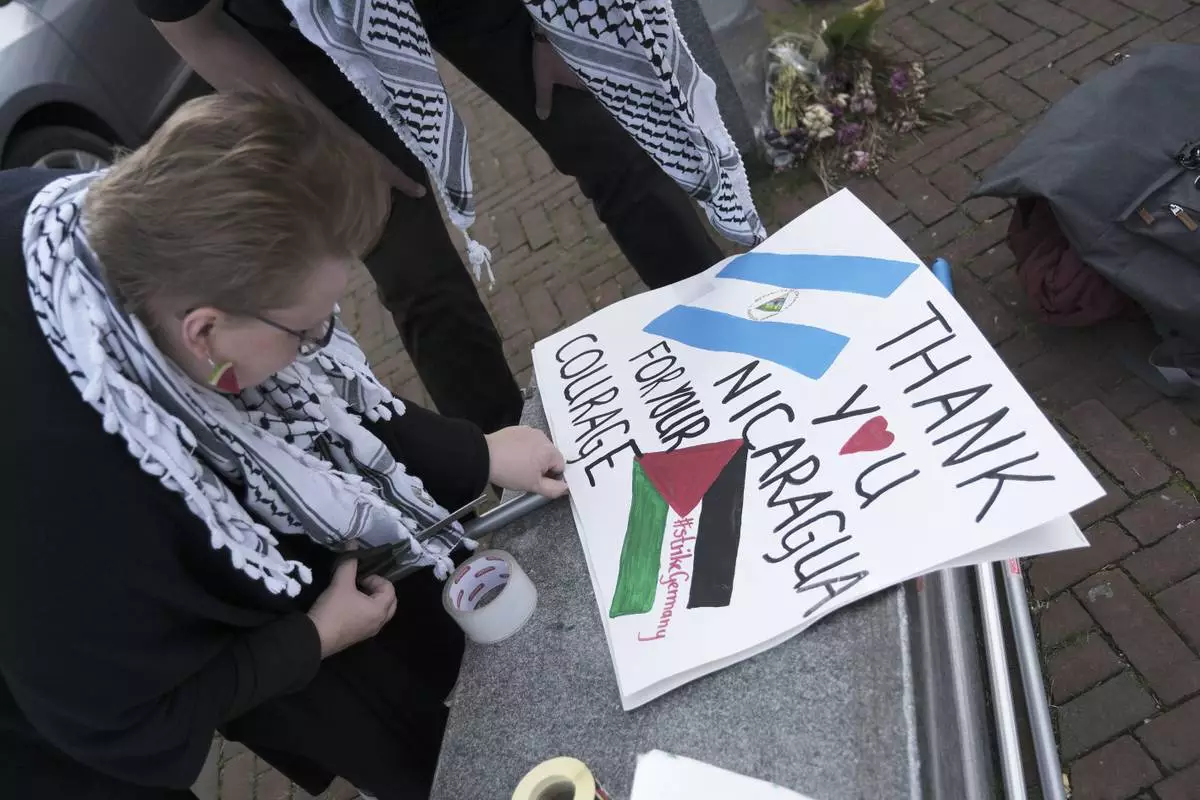
A pro-Palestinian activist works on a protest poster near the International Court of Justice, or World Court, in The Hague, Netherlands, Monday, April 8, 2024, prior to the start of a two days hearing in a case brought by Nicaragua accusing Germany of breaching the genocide convention by providing arms and support to Israel. (AP Photo/Patrick Post)
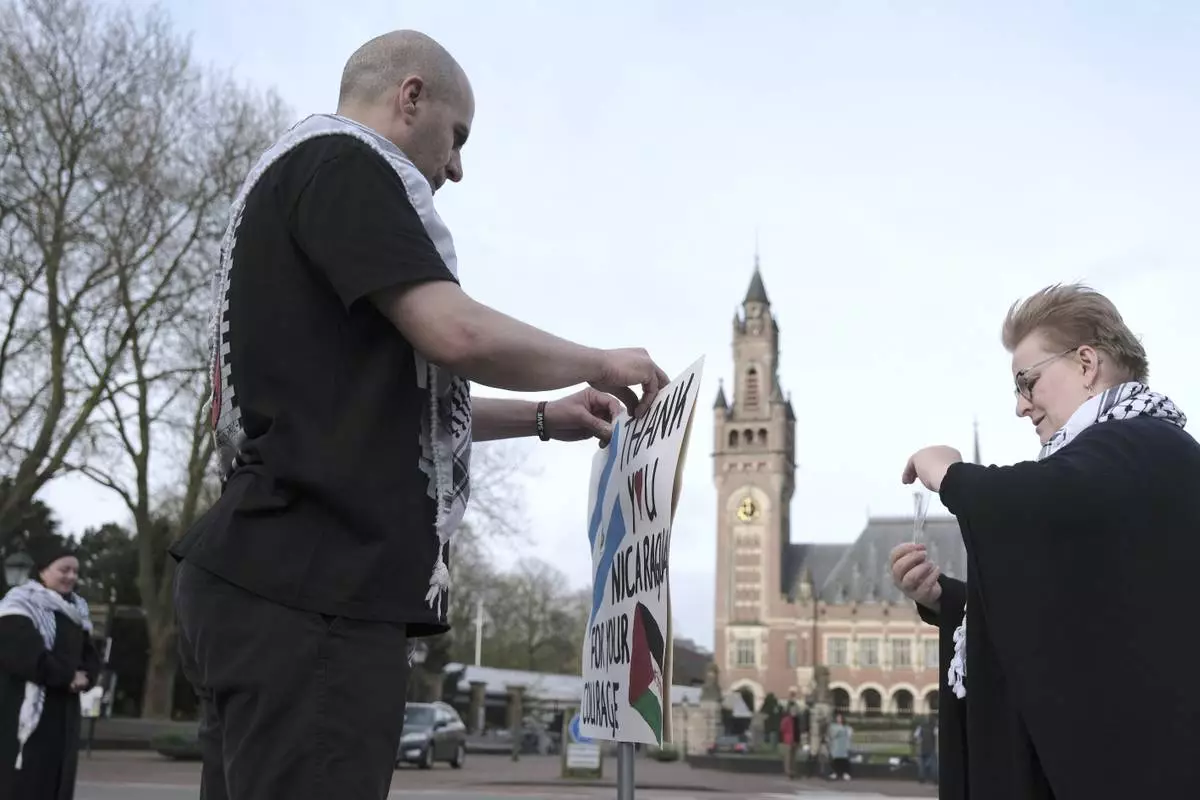
A pro-Palestinian activist works on a protest poster near the International Court of Justice, or World Court, in The Hague, Netherlands, Monday, April 8, 2024, prior to the start of a two days hearing in a case brought by Nicaragua accusing Germany of breaching the genocide convention by providing arms and support to Israel. (AP Photo/Patrick Post)









